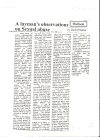Child Sexual Abuse
Many adults can function understandingly and intimately with one another and raise happy and well-adjusted children. However, most children are born into dysfunctional families, where victimization of each other becomes the normal pattern of behavior. Children are not treated with love and respect because their parents haven’t learned how to love and respect themselves or others or are following patterns of behavior learned from their own parents. Most people are suffering from low self-esteem, self-hatred or guilt. Although a majority of parents want their children, they apparently seem compelled to project their own problems onto them or neglect, abandon or in other ways abuse them.
An infant’s needs, in addition to proper nourishment, clothing and shelter, are touching, holding, eye to eye contact, speaking, and breast feeding. In this manner bonding, a feeling of unity or intimacy is achieved between the child and caregiver. Infancy is the beginning of the need of intimacy which continues throughout the individual’s life. Children may die if their need for intimacy is not met, or they may be unable to become contributing members of society.
However, the caregiver may be able to provide only minimal amount of intimacy, because he may have been the recipient of a minimal amount himself and feels the crippling effects of the loss. This loss and a history of being abused may cause him to cross over into sexually abusive behavior.
Many parents treat their children how they were treated: They do not talk to them, hold or hug them, or breast feed them. The children are propped up to be bottle fed, and as a result, they regurgitate because they are denied needed nurturing. They are uninstructed about how to behave, and when they begin their attempts to learn about the world around them, they are beaten. They are treated differently for the same behavior, and are ignored when they desire anything. As a result of this abuse and lack of intimacy, they become fearful of intimacy and rejection, retreat into a shell, and sometimes “get even” by indiscriminately striking out at whoever is available.
The child is rightly considered to be precious and of inestimable value. Yet, the mere presence of the child may create joy, delight, frustration, anger, or rage in the older child or adult. An older child may view the younger as a threat or a source of intense pleasure and delight. A lack of instruction, or instruction by example could occur when the older child confronts his own need for intimacy. The younger child may be viewed as an object for the gratification of the older child or adult. A feeling of bonding may change to a feeling of ownership. The younger child’s rights are not considered, or, if they are, they are not considered with a full and complete understanding of the overwhelming and devastating impact their denial can have upon the child. With ignorance and/or deficit of training in self-control the younger child may be touched abusively, which can result in feelings of shame and guilt by the younger child, the older child, and/or the caregiver.
When the child reaches that age of 4 or 5, he may find the caregiver of either sex to be fascinating, and be attracted to him. This approach by the child is normal and should be expected by the caregiver. The caregiver’s defenses should be capable of withstanding this approach of the child. However, the caregiver may not be able to exercise adequate self control and may yield to the curiosity of the child where the caregiver’s need for intimacy was or is not being satisfied.
As an adult, the victim may become hostile toward and never want to see the abusive caregiver. The victim’s desire to overcome his loneliness may be thwarted. He may disclose the abuse, which could have devastating consequences upon the caregiver. He may be at risk for future victimization and may develop problems with low self-esteem or postr traumatic stress disorder. It may cause the victim to vary from promiscuity to prostitution, or it may cause him to be unable to function heterosexually as an adult. The mere touch of the opposite sex may cause trauma and a desire to be left alone in the formerly abused child. This could result in extreme frustration to the victim, because of the biological and psychological need to have a child. And in may cases his choice of spouse may resemble the abusive parent.
Feelings of resentment and anger may be physically and psychologically devastating to the victim. Release from the trauma and guilt may come through individual or group therapy, role playing, mentoring, or reciting positive affirmations. Perhaps the greatest healing may come from understanding and forgiveness.
David C. Hakim
(as published in the Chaldean Detroit Times June 18, 1994)
Click thumbnail
to view actual
article.

